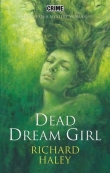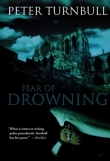
Текст книги "Swains Lock"
Автор книги: Edward A. Stabler
Жанры:
Триллеры
,сообщить о нарушении
Текущая страница: 6 (всего у книги 25 страниц)
Chapter 7
Newspapers
Friday, December 1, 1995
The periodicals room at McKeldin Library was quiet on a Friday morning, with students scattered at tables and through the carrels. It had taken Vin fifteen minutes of fast-paced walking to reach the University of Maryland library from the visitors lot, but then only a few words from the librarian and a minute in the rows of filing cabinets to find the reel of microfilm he wanted.
He placed it on the spindle, threaded it onto the empty reel across the viewing plate, and scrolled forward. Near the end of the tape he found the newspaper edition he was looking for.
The Washington Post: Sunday, March 30, 1924
Death and Loss in Flood Widespread
Floods in the upper Potomac and upper Ohio rivers and their tributaries have brought death and vast destruction. Bridges have been swept away and trains marooned.
Cumberland, MD property loss – Railroads, $5,000,000; buildings, $1,000,000.
Flood deaths – McCoal, MD., 6; Cumberland, MD., 3; Newark, OH., 4; Johnstown, PA., 1; Pittsburgh, 2; Melcroft, Penn., 3;
The remainder of the article cited a cold wave and snow in the midwest.
He advanced slowly but found no reference to an incident at Swains Lock on the preceding day. None of the other articles even mentioned the C&O Canal. He scrolled to the next day’s issue and found only one related article:
The Washington Post: Monday, March 31, 1924
Pittsburgh Flood Ebbs; Steel Mills are Hard Hit
A score of city blocks in the lower sections were inundated, and sections for several miles upstream laid waste when both the Allegheny and Monongahela rivers, meeting here to form the Ohio, left their banks today in Pittsburgh’s greatest flood in 10 years. No loss of life was reported…
Aware that the Potomac flood had actually reached Washington on March 31, he advanced the reel again.
The Washington Post: Tuesday, April 1, 1924
Crest of Flood is Receding, but Damage Has Increased
The crest of the flood-swollen Potomac swept swiftly by Washington yesterday with the ebbing tides. After a futile effort at high tide yesterday to touch the high water mark at 8 feet registered on the morning rise, the waters quickly fell back in their path and raced on to the bay, with the remnants of the wreckage from upstream…
Water observers estimated that the current was moving at a greater speed than the day before, but it raced off solemnly, its wrath apparently spent. No waters overlapped the others in the flow; they all kept in their place. It was a rhythmic, quick march of a victor to the sea…
There was one float that gave mute evidence of the havoc wrought in one popular industry of the river swamps. It was a copper still, its tarnished nose bobbing about on the racing water like a buoy.
With communication lines along the Potomac damaged by the flood, Vin guessed that a full description of the devastation in the upper valley would have taken several days to trickle in to the Washington newspapers. And those papers were no doubt focused on stories of more global interest. Whatever Lee Fisher saw or experienced at Swains Lock on March 29 would not be chronicled in the 1924 Washington Post, the Baltimore Evening Sun, or any other newspaper archived at libraries. So Vin’s search for Lee Fisher’s truth would have to rely on the words in his note. Rewinding the microfilm, he parsed the message once more in his head.
Charlie,
If it is April and I am missing, I fear I have been killed…
The books made clear that Charlie Pennyfield tended Pennyfield Lock in 1924. Maybe Lee’s fear had proven idle; maybe he hadn’t been killed because of what happened at Swains Lock. But then why hadn’t he retrieved the note? Why should he leave a clue to buried money behind a marked plank in Charlie’s shed if he were alive and well in the days that followed?
Vin wondered whether the money Lee referred to was stolen. If so, Charlie could have launched some kind of investigation, putting Lee at risk of being considered a criminal or an informer. If Lee were alive in April, 1924, why not just take the money himself? It didn’t make sense, he thought, looking up and arching his back. For that matter, if Lee survived into April, why abandon a useful hand-drill that might be expensive to replace?
To Vin, the prospect that Lee’s fear had come true seemed more likely. Maybe Lee was buried along with the others at the base of three joined sycamores at the edge of a clearing. Something had happened to Lee, and Charlie never found the message that would lead him to the communal grave beneath the sycamores. Who else was buried there? The note gave no hint. Was Emmert Reed involved? Maybe his albino mule had hauled the bodies to the clearing it “knowed well”. Along the towpath somewhere?
If Vin could find the place and its joined sycamores, what else would he find? The money, the killers, and the dead? The dead might still be there. The killers, if given a chance, would have come back for their spoils. But maybe the flood had interfered somehow. Or maybe the killers had been caught or killed. Maybe the money was still there, waiting to help Vin tell the story of what happened at Swains Lock. The story’s tentacles had begun to embrace him, and for reasons he couldn’t define, he almost felt destined to become part of it himself. Maybe the last line in Lee’s note really did apply to him.
He boxed up the Post and Sun microfilms and returned them to their filing cabinets. Walking back across the campus to his car, he forced himself to snap out of his musings. He’d been working on the Rottweiler project all week and needed to submit an invoice to them tomorrow. He slowly pieced together a snapshot of the project in his mind. One day away from it and already it seemed tedious; the problems it posed were straightforward and didn’t require creative or elegant solutions – just grinding away.
His trip to College Park had been fruitless, since he’d found the same books he’d already seen at the C&O Visitor’s Center, the Potomac Library, or the Montgomery County Historical Society. None provided additional insight into the only leads he possessed: Lee Fisher, K. Elgin, Charlie Pennyfield, Emmert Reed. Aside from Pennyfield, all the surnames were common to the area. Across Maryland and Virginia, there were hundreds of Fishers, Elgins, and Reeds. And the joined sycamores reference, he thought, wasn’t much help either. The sycamores along the river and the towpath were too numerous to count.
Chapter 8
Spanish Ballroom
Saturday, December 30, 1995
As the lead singer issued his best Joe-Cocker moan and backed away from the microphone, all three saxmen raised their horns and the first tenor launched into a wailing lead. The bass and rhythm guitar set a crawling floor under the horns and the keyboard player hammered trills. Spinning through a swing-dance sequence with Vin, Nicky saw the dimly-lit features of the Spanish Ballroom blur into panorama: the walls painted pale yellow with inlaid patterns of faded blue, orange, and green tiles; the mission-style squared-arch openings to the outer arcade that surrounded the floor; the tall, worn obelisks with art-deco accents flanking the raised stage; the second-story casement windows and balconies with balustrades, looking down on the dance floor; and the blond, rock-maple floor itself, dulled and dry but unbroken, stretching off over a hundred feet from the stage through dim light to the far end of the ballroom. Toward that end, two long tables formed a bar that faced the stage. Past the bar stood a Christmas tree, fifteen feet tall and twined in colored lights and ornaments.
The singer strode forward again, grabbing the microphone from its stand and shooting a look at the two women singing backup vocals. When the lead sax fell back into the rhythm, he belted out the final verse of “Unchain My Heart.” And the whole band let loose on the refrain, with the lead singer clutching and bleating and the backup singers wailing soulfully against the saxes.
Vin spun away from a swing move as he and Nicky segued into solo steps. The floor had grown crowded near the stage and Nicky felt an elbow spear her upper arm. She looked over at Vin, who was bobbing his head and shoulders toward the floor and holding his outstretched fingers before him, aping the saxmen as his black blazer flopped from his sides. He arched upright again, released the imaginary sax, and swept his hair back from his glistening forehead. He smiled at Nicky and the sharp point of his upper canine tooth gave him a wolfish look. The dancers around him thrust and spun.
She smiled back, closed her eyes, and danced a rhythmic shuffle as the refrain repeated and built toward a climax. Opening her eyes she saw the painted balustrade of a windowed balcony on the side wall and suddenly felt disoriented. She looked at the crowd, at Vin, and recognized no one. The arm she extended wasn’t her own. As the band held the final note and the cymbals rattled into a terminal bass-drum thump, she turned toward the stage. The music stopped and she felt a light hand on her shoulder. She turned and saw Vin. Through the whistling and applause, the lead singer said the band would take a break.
“That was strange,” she said, catching her breath. “I had the feeling for a moment that I didn’t exist, even though I could see and hear everything around me.”
“Like a trance?”
“No,” she said, shaking her head. “Like a combination of amnesia and déjà vu.”
“I think they call that early-onset Alzheimer’s.”
“Great,” she said glumly. “It only lasted a second.”
Vin prescribed champagne and set off to retrieve two glasses. Nicky said she’d wait near the side wall as he turned to negotiate the drifting crowd. Making her way toward the wall, she felt someone squeeze her forearm.
“Hey, you!” said Abby Tuckerman. “I was hoping you and Vin would be here!”
“We weren’t going to miss it,” Nicky replied. “Especially since it was the only New Year’s party we heard about! Plus it’s for a good cause, and Vin was excited about the band. He’s been doing his Joe Cocker imitation for days.” She rolled her eyes as Abby laughed.
“Speaking of that good cause,” Abby said, leading Nicky away by the forearm, “let me introduce you to one of the beneficiaries.” She tapped a tall black woman on the shoulder and the woman turned toward them. Faint lines around her mouth and eyes told Nicky she might be in her early forties. She wore a tight-fitting gold sweater over black pants and leather mules. Casual and elegant at the same time, Nicky thought. The woman greeted Abby and listened.
“Teresa, this is Nicky Hayes. Nicky’s a vet; she works with me at the Potomac Clinic. Nicky and her fiancée just moved here from Boston a few months ago.”
“Well, welcome,” Teresa said. She held out her hand and Nicky took it – long fingers and artistic onyx and amber rings.
“And this is Teresa Carillo,” Abby said, “one of the original members of the Glen Echo Artists Collaborative.”
Teresa’s laugh was quick and bright. “I was afraid you were going to say oldest!” To Nicky she said earnestly, “Thanks for coming to our party. I’m glad someone told you to dress warm, since the Spanish Ballroom has never had heat!”
“It’s an amazing place, anyway,” Nicky said.
“It still is,” Teresa agreed, surveying the room. “Even though it’s just a ghost of its former self. In the 1930s and 1940s, hundreds of couples came to dance in this ballroom on spring and summer nights.”
“And the old Glen Echo amusement park here was the biggest and best in the area,” Abby said. “It had a roller coaster, a carousel, and the Crystal Pool… People used to take the trolley out here from D.C. I think they finally shut it down in the late 60s.”
“Too bad,” Nicky said. “It seems like a perfect location… on a hillside above the river.”
“But now it provides studios for struggling local artists,” Teresa said.
“Don’t give me that struggling stuff, Teresa! Maybe in the 70s, but not now!”
“What kind of art do you create?” Nicky asked.
Teresa explained that she was a sculptor, and that early in her career she had designed large architectural and spatial compositions out of mixed media, “the kind of stuff you’d see in a public park”, but that those pieces were hard to sell. Now she was working primarily in bronze, creating smaller abstract works for the grounds of suburban estates.
Abby mentioned that Teresa’s dog Floyd, an enormous Great Dane, was well known at the Clinic, and Teresa said she hoped Floyd would meet Nicky soon. She excused herself and Abby turned toward Nicky. “How’s everything going with you guys? I never get a chance to chat with you at work. Is Vin still consulting?”
“We’re doing well. We’ve almost got a date for the wedding, which looks like late October. And Vin’s plugging away on his consulting project. He hasn’t begun looking for a permanent job, but I’m hoping he’ll get started after the holidays. Sometimes he goes off on tangents. Right now he’s fascinated by the history of the C&O Canal.”
Abby nodded. “The canal is like the Spanish Ballroom. What’s left is just a skeleton, but that’s enough to give you a sense of what it used to be.”
***
Teresa slipped through the crowd and walked out into the arcade surrounding the dance floor. She stopped to greet a stocky man with bushy black hair and a streaked beard who was having an animated conversation with a younger couple.
“Great party, Lewis. Seems even busier than last year.”
Lewis grinned and nodded knowingly. “The gate is looking good so far.” He wagged a thick finger at Teresa. “Marketing,” he said. “Posters, newspaper mentions, getting the right band. It makes a big difference. Tell Bonnie you agree with me!” he added with a wheezy laugh. “Next year we’ll have the word on the street working for us!” He winked and turned back toward the young couple.
For all of Lewis’ bluster and pedantry, Teresa thought, the Collaborative was lucky to have him involved. Like Teresa, most of the artists were willing to help with maintenance and community outreach, but few wanted to take responsibility for organizing programs or events. Lewis was willing to throw himself into those roles. Teresa wandered past small clusters of people, then spotted a group of familiar faces standing underneath an archway.
“Hey, Teresa,” said a tall man with a leather jacket and gray ponytail. “Where did you hide the good champagne?”
“Moi? Ask Lewis, he’s the major domo.”
“Yeah,” said the man’s companion, a curvy redhead. “We keep telling the bartender that we saw a case of Mumms in the hallway earlier, but he says he only has Korbel!”
“Maybe Lewis is having an after-party he hasn’t told us about,” Teresa said.
“Maybe we’ll just have to squeeze some answers out of him,” said a slim blond woman wearing a cashmere sweater, short black skirt, and tights. She ground her knuckles into her palm, pursed her lips, and squinted menacingly. “I think you know what I’m trying to say.”
“Hmm, could it be…” Teresa said, “…Fashodan jujitsu?”
“Exactly.”
“You’re hired, Kelsey,” said the redhead. “Lewis doesn’t stand a chance against the two of you.”
“C’mon,” Kelsey said, pulling Teresa aside. “Let’s do our reconnaissance. First, we’ll interrogate the bartender.” They walked arm-in-arm into the back half of the ballroom.
“Did you bring Peter tonight?” Teresa said.
“Nah, he’s in Las Vegas,” Kelsey said. “With some fat-cat Japanese client who likes to gamble, I guess. He invited me to go with him but I begged off. Las Vegas depresses me.” A younger man walked by them, smiled, made fleeting eye contact.
“Maybe he’s available as a stand-in,” Teresa said.
“Not bad. Maybe I should look around. There are a lot of unfamiliar faces here.”
“Same for me,” Teresa said. “I’ve already met a few. Abby Tuckerman introduced me to a new vet she hired. Nicky something. Cute girl.”
“Nicky Hayes,” Kelsey said, eyeing Teresa sidelong. “She moved here with her fiancée.”
“Wow, you’re well connected,” Teresa said.
“I met them a couple of months ago on the towpath. We had a little dog-on-dog encounter. I dropped by their house to pick up some meds for Allie.”
“You know, it’s funny,” Teresa said. “She reminded me of someone we knew a long time ago. In high school. Even though they don’t look anything like each other. I’m not really sure why, but it’s something about her eyes, or her mouth.”
Kelsey nodded. “I know who you’re thinking of. Des Gowan.”
“That’s it,” Teresa said, her voice softening. “You saw it too. Des.”
***
As he left the bar with two glasses of champagne, Vin was greeted by a bear-shaped man who was standing nearby and talking to a wiry younger man with rimless glasses and a goatee. It took Vin a second to retrieve the name of the larger man: Doug Tuckerman. Vin said hello and wished him a happy new year.
“Cheers,” Doug said, raising his glass. Looks like scotch on the rocks, Vin thought while lifting a champagne glass in response. He hadn’t seen any scotch on the bartender’s table.
“You and Nicky must be pretty well settled in by now.”
“Pretty well. At least we’ve unpacked everything, and we don’t have to look at maps every day to find our way around.”
“Well, you found your way down to Glen Echo. Vin, let me introduce you to an old friend of Abby’s and mine, Bryce Lemond.” He pivoted and Vin introduced himself.
“Bryce and Abby were neighbors growing up in Chevy Chase, and Vin’s fiancée works with Abby,” Doug said. “Vin, you moved here from… New England was it?” Seemingly uninterested in Vin’s response, Doug studied his drink and swirled the ice, then took a long sip.
Vin confirmed that he and Nicky had moved to Potomac and lived near Pennyfield Lock.
“Bryce is a rock climber,” Doug offered. Bryce explained that the Virginia side of Great Falls had a variety of climbing routes in Mather Gorge, about a half-mile downstream from the Falls. It could get pretty crowded, so you had to know where and when to go.
“I’ve always wondered whether I’d like climbing,” Vin said. As Doug ducked away, Vin added that he’d never climbed outdoors but had tried climbing at rock gyms a couple of times, and his impression was that footholds were more important than handholds. The band had started its second set, so Vin and Bryce angled behind the bar toward the Christmas tree, where it was quieter. Bryce confided that there was a great climbing spot for beginners and experienced climbers on the Maryland side of the river at a place called Carderock. A line of forty-foot rock faces was hidden in the trees on the hillside just a few steps from the water. Vin finished his champagne and looked guiltily at the full glass he’d promised to bring to Nicky.
“Hi, Bryce,” chimed a woman's voice from over Vin’s shoulder.
Bryce grinned and leaned in to kiss the woman on both cheeks. Her dirty-blonde hair was pulled back and she wore a gray cashmere sweater. When she backed away, Vin recognized her and his pulse quickened for an instant.
“Hi, Vin,” she said, extending her hand and smiling. “Kelsey Ainge.”
“Nice to see you again. How’s your dog?”
“Her ear healed without a trace. Please thank Nicky again for the ear spray.”
“Kelsey, you used to do some climbing,” Bryce said. “I was just telling Vin that Carderock is a good spot for beginners.”
“It’s true. The terrain around Great Falls has a little bit of everything…”
“Even the trails are a nice escape,” Bryce said. “The woods are beautiful.”
Vin said that he was from Maine and had grown up around both hardwoods and evergreens. He gestured toward the Christmas tree. “I think I’ll miss seeing snow on the pines and hemlocks,” he said. “The river environment is growing on me, but I’m not sure it offers as much variety as New England.”
“Oh, you’d be surprised,” Kelsey said. “You can see all kinds of interesting things in the woods here. And trees you probably don’t see in Maine, like sycamores.” The band had downshifted into “Can’t Find My Way Home”, and Vin listened to the lead singer’s lament in the background.
“In fact,” Kelsey continued, “there’s a spot just downstream from Carderock, a few steps off the Billy Goat Trail, where three old sycamores are joined together near the base.” Vin looked at her gray-green eyes, which flitted infinitesimally side to side before coming to rest on his. By reflex he found himself silently reciting Lee Fisher’s message again:
I may be buried along with the others at the base of three joined sycamores at the edge of a clearing.
The room seemed to tilt a few degrees and grow hazy as the music and nearby conversations fused into an ambient hum. He squinted hard at Kelsey as she returned his stare and his thoughts darted forward like a rabbit through the haze. You’ve read Lee’s note. How? When? Did you write the penciled message in the library book? Maybe you authored Lee’s note yourself and planted it in the shed. No, that makes no sense: the photo, the drill… it was a complete fluke that I found it in the first place. You’re drawing me into some kind of game. To what end? What is it you want?
“Excuse me for a few minutes,” he said, raising the full glass a few inches and smiling uncertainly at Kelsey and Bryce. “I need to go find Nicky.”








